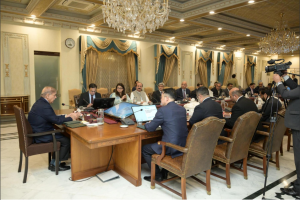On Wednesday, Prime Minister Shehbaz Sharif called for the development of a swift plan to ensure that Information Technology becomes a required subject starting from Grade 6 throughout the nation.
The PM led an important review meeting focused on the issues related to the Ministry of Information Technology and Telecommunication. He highlighted that boosting the IT sector and increasing IT-related exports are key priorities for the government, according to a news release from the Prime Minister’s Office.
“The integration of IT into school curricula is essential for equipping our future generations to meet the challenges of the digital economy,” stated PM Shehbaz, urging a collaborative approach with provincial governments to guarantee high-quality and standardized IT education and training across schools, colleges, and universities.
The prime minister also directed the Ministry to launch IT training initiatives in less developed areas, especially in Islamabad, Gilgit-Baltistan, Azad Jammu and Kashmir, and Balochistan.

The officials from the Ministry gave the prime minister a thorough update on the current initiatives and the projects on the horizon. One of the highlights was the “School Broadband Connectivity Project,” which is all about enhancing internet infrastructure in schools across Islamabad.
During the meeting, it was shared that for the fiscal year 2024–2025, the Ministry has already delivered advanced IT training to 49,800 individuals and general training to more than 600,000 people.
Officials from the Ministry provided the prime minister with a thorough briefing on the current situation. In partnership with Huawei, they’re setting up skills and vocational training centers at the International Islamic University Islamabad, the National University of Sciences and Technology (NUST), and the COMSATS University Lahore campus.
On top of that, Huawei’s cutting-edge training programs in Artificial Intelligence, Cloud Computing, Big Data, and Cybersecurity have been woven into the curricula at the Ghulam Ishaq Khan Institute of Engineering Sciences and Technology (Topi), the University of Engineering and Technology (Taxila), and the Mehran University of Engineering and Technology (Jamshoro).
The Ministry of Federal Education and Professional Training, teaming up with Huawei, is set to train 146,367 students and enhance 1,300 laboratories nationwide. This initiative aims to particularly benefit students in Islamabad, Gilgit-Baltistan, and Azad Jammu and Kashmir.
The meeting brought together key figures, including Federal Minister for Economic Affairs Ahad Khan Cheema, Federal Minister for IT and Telecommunication Shaza Fatima Khawaja, Chairman of the PM Youth Program Rana Mashhood Ahmad Khan, senior government officials, and Huawei CEO Ethan Sun.
Prime Minister Shehbaz Sharif emphasized that the government is focusing on equipping the nation’s workforce with skills and training that meet international standards. He made these remarks during a meeting with a seven-member delegation from the Association of Chartered Certified Accountants (ACCA), led by Chief Executive Helen Brand OBE, who visited him at the PM House.
In their discussion, the delegation underscored the significant role that ACCA plays in fostering the development of Pakistan’s economy.
The delegation let the prime minister know that there are 13,000 Pakistani members of the ACCA working in different sectors all around the globe, while about 40,000 students are currently on their way to becoming ACCA members.
For the latest updates and insights on new developments, visit the NEWSON
Q1. What is the new IT education initiative?
The government has announced that IT will become a mandatory subject from Grade 6 across Pakistan to prepare students for the digital economy.
Q2. Why is IT education important?
IT education equips students with essential skills for the digital economy, supports the IT sector, and boosts exports.
Q3. How will the plan be implemented?
The Ministry of IT is working with provincial governments to standardize IT education across schools, colleges, and universities nationwide.
Q4. What projects are underway?
Key projects include the “School Broadband Connectivity Project” and advanced IT training programs in AI, Cloud Computing, and Cybersecurity.
Q5. How many people have received IT training?
Over 49,800 people received advanced IT training, and more than 600,000 individuals have undergone general IT education.
Q6. Who is helping with this initiative?
Huawei is collaborating with Pakistani universities to set up training centers in advanced IT fields like AI and Cybersecurity.


